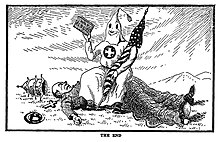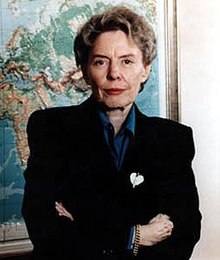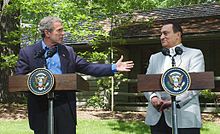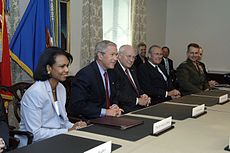From Wikipedia, the free encyclopedia
https://en.wikipedia.org/wiki/Christian_terrorism
Christian terrorism, a form of religious terrorism, comprises terrorist acts which are committed by groups or individuals who profess Christian motivations or goals. Christian terrorists justify their violent tactics through their interpretation of the Bible and Christianity, in accordance with their own objectives and worldview. These interpretations are typically different from those of established Christian denominations.
These terrorist acts can be committed against members of other Christian denominations, adherents of other religions, secular governments, groups, individuals or society as a whole. Christianity can also be cynically used as a rhetorical device to achieve political or military goals by terrorists.
Christian terrorist groups include paramilitary organizations, cults, and loose groups of people that might come together in order to attempt to terrorize other groups. Some groups also encourage unaffiliated individuals to commit terrorist acts. The paramilitary groups are typically tied to ethnic and political goals as well as religious goals and many of these groups have religious beliefs which are at odds with the religious beliefs of conventional Christianity.
Terminology
The literal use of the phrase Christian terrorism is disputed. It appears in the academic literature to describe a large range of actions and beliefs.
Religion can be cited as the motivation for terrorism in conflicts that have a variety of ethnic, economic and political causes, such as the one in Bosnia. In cases such as the Lord's Resistance Army or the Taiping Rebellion the beliefs of the founders differ significantly from what is recognizably Christian. In such cases the term Christian terrorism is problematic despite the claim that they are motivated by their religious beliefs.
The term terrorist can also be applied for disingenuous reasons, to encourage public support for a groups vilification or allow the use of stricter laws in punishing a group or individual. The intimidation of minority communities along with sporadic acts of violence do not typically get referred to as terrorism. However, in 2015 a majority of Americans from the Democratic and Republican political parties thought that "attacks on abortion providers [should] be considered domestic terrorism".
History
There is no record of indiscriminate acts of violence or attempts to use terror as a religious weapon by early Christian groups. Christianity came to prominence in the Roman Empire during and directly after the rule of Constantine the Great (324-337 AD). By this time it had spread throughout western Asia as a minority belief and it became the state religion of Armenia. In early Christianity there were many rival sects, which were collectively persecuted by some rulers.
Gaining state backing by a particular Christian sect or creed led to an increase in religious violence. This violence took the form of persecution of adherents of rival Christian beliefs and persecution of adherents of other religions. In Europe during the Middle Ages Christian antisemitism increased and both the Reformation and Counter-Reformation led to an increase in interdenominational violence. As with modern examples it is debated as to what extent these acts were religious as opposed to ethnic or political in nature.
Gunpowder Plot
The early modern period in Britain saw religious conflict resulting from the Reformation and the recusancy that emerged in opposition to it. The Gunpowder Plot of 1605 was a failed attempt by a group of English Catholics to assassinate the Protestant King James I, and to blow up the Palace of Westminster, the English seat of government. Although the modern concept of religious terrorism, or indeed terrorism at all, had not yet come into use in the seventeenth century, David C. Rapoport and Lindsay Clutterbuck point out that the Plot, with its use of explosives, was an early precursor of nineteenth century anarchist terrorism. Sue Mahan and Pamala L. Griset classify the plot as an act of religious terrorism, writing that "Fawkes and his colleagues justified their actions in terms of religion." Peter Steinfels also characterizes this plot as a notable case of religious terrorism.
Mountain Meadows Massacre
Pogroms
Orthodox Christian-influenced movements in Romania, such as the Iron Guard and Lăncieri, which have been characterized by Yad Vashem and Stanley G. Payne as antisemitic and fascist, respectively, were involved in the Bucharest pogrom and committed numerous politically motivated murders during the 1930s.
Ku Klux Klan
After the American Civil War of 1861–1865, former Confederate soldiers founded the Ku Klux Klan (KKK) organization. Originally, the Ku Klux Klan was a social club, but a year after it was founded, it was taken over by "night rider" elements. It then began engaging in arson, beatings, destruction of property, lynchings, murder, rape, tar-and-feathering, whipping, and voter intimidation. The Klan targeted newly freed slaves, carpetbaggers and scalawags, and the occupying Union army. That iteration of the Klan disappeared by the 1870s, but in 1915 a new Protestant-led iteration of the Klan was formed in Georgia, during a period of xenophobia and anti-Catholicism. This version of the Klan vastly expanded both its geographical reach and its list of targets over those of the original Klan.
Vehemently anti-Catholic, the 1915 Klan espoused an explicitly Protestant Christian terrorist ideology, partially basing its beliefs on a "religious foundation" in Protestant Christianity and targeting Jews, Catholics, and other social and ethnic minorities, as well as people who engaged in "immoral" practices such as adulterers, bad debtors, gamblers, and alcohol abusers. From an early time onward, the goals of the KKK included an intent to "reestablish Protestant Christian values in America by any means possible", and it believed that "Jesus was the first Klansman". Although members of the KKK swear to uphold Christian morality, virtually every Christian denomination has officially denounced the KKK.
From 1915 onward, "second era" Klansmen initiated cross burnings (adapted from scenes in the 1915 film The Birth of a Nation), not only to intimidate targets, but also to demonstrate their respect and reverence for Jesus Christ. The ritual of lighting crosses was steeped in Christian symbolism, including prayer and hymn singing. Modern Klan organizations remain associated with acts of domestic terrorism in the United States.
Start of modern terrorism
Mark Juergensmeyer, a former president of the American Academy of Religion, has argued that there has been a global rise in religious nationalism after the Cold War due to the post-colonial collapse of confidence in Western models of nationalism and the rise of globalization. Juergensmeyer categorizes contemporary Christian terrorists as being a part of "religious activists from Algeria to Idaho, who have come to hate secular governments with an almost transcendent passion and dream of revolutionary changes that will establish a godly social order in the rubble of what the citizens of most secular societies regard as modern, egalitarian democracies".
According to terrorism expert David C. Rapoport, a "religious wave", or a cycle, of terrorism, dates from approximately 1979 to the present. According to Rapoport, this wave most prominently features Islamic terrorism, but it also includes terrorism by Christians and other religious groups that may have been influenced by Islamic terrorism.
Reason for claiming a Christian motivation
Numerous individuals and groups have cited their Christianity or Christian beliefs as the motivation for their terrorist acts. This can mean that they see Christianity as their identity and the main reason for their existence, partially in contrast to the identities and existence of other groups which they consider threatening and non-Christian. Terrorists can also cite their interpretation of the Bible or Christian beliefs as their motivation. All types of terrorism have a complex interrelationship with psychology and mental health, however only a minority of terrorists have diagnosable medical illnesses. Christianity can also be disingenuously claimed as a motive to inspire followers or curry political favor or protection. All these motivations are not independent and often complexly interwoven.
Christianity as an identity
Religion is often closely tied to ethnic identity, economic standing and self image. Should a group of Christians feel threatened, religion is a verifiable, culturally important label to use in creating a "them-and-us" mentality. This is particularly the case where both groups share membership in a broadly similar cultural group, for example the breakup of Yugoslavia and the Lord's Resistance Army in Uganda. In situations where the opposing ethnicities are more diverse, different skin colors and/or cultural practices are sometimes used as identifiers of the other. In these cases terrorists may call themselves Christians, but they may not be motivated by any particular interpretation of Christian beliefs. For example Anders Behring Breivik, who considers himself "culturally Christian", cited saving Christian Europe as the motive for his attacks. In this way the use of Christianity serves as a legitimizing device for acts of violence and claims of solidarity with a wider social group. In such cases Christianity is a label which does not necessarily have any connection to any Christian texts, beliefs or practices. Studies have even found that the more intense one's religious practice, the less likely they are to be radicalised.
This cultural Christian identity is often reinforced in the mind of the terrorist by media and governmental sources that vilify the other group or amplify its threat. This politicizing of ethno-religious tensions is a key contributor to the violence in the Central African Republic. The targets of this kind of terrorist motivation include other religions or denominations, but they can also include those who the perpetrator believes are threatening to him or her in any way, such as LGBT people or members of any group which does not conform to the perpetrator's view of who they are.
When the opposing group is also Christian but belongs to a different denomination, it is often denounced as non-Christian or anti-Christian. For example, the leader of the Orange Volunteers, who described themselves as Protestant fundamentalists, defended their attacks on Catholic churches on the basis that they were "bastions of the Antichrist".
Interpretations of Christian morality or theology
Perpetrators have frequently cited their very individual forms of Christianity as both a justification and a motivation for their actions. Typically as with attacks on abortion clinics or LGBT people the perpetrators use a nuanced negativity from an established Church as justification for unsanctioned acts of violence. However, they may also have a wholly individual theology that is unrecognizable as established Christian dogma. Conventional Christian Bible interpretations also offer a number of sanctions against violence as a political or religious weapon.
Mental health
There are a wide variety of mental health conditions and illness, and it is quite rare for them to lead to violence. Objectively determining the mental health of a terrorist is often complicated by a number of factors. There is minimal statistically robust information specifically on terrorists who claim Christian motivation. However, one study claims that about 30% of right wing, 52% of single issue and 25% of Al Qaeda related individual terrorists and 8% of those in a terrorist group have a mental illness. Another study found that about 53% of individual terrorists could have been characterized as socially isolated before their attacks. People in some terrorist groups are less likely to have a mental illness than the general population, due to the selection criteria of such groups. Mental illness does not seem to unduly prevent terrorists from performing successful complex attacks.
Tactics of terrorists
Terrorists who claim to have a Christian motivation can act alone or in groups. It is often difficult to determine if the perpetrator acted completely alone or was inspired by a religious or political group. The same problem exists with Islamic terrorism or any allegedly religiously or politically motivated act of terror.
Anti-abortion violence
On 16 July 2001, Peter James Knight walked into the East Melbourne Fertility Clinic, a private abortion provider, carrying a rifle and other weapons including 16 litres of kerosene, three lighters, torches, 30 gags, and a handwritten note that read "We regret to advise that as a result of a fatal accident involving some members of staff, we have been forced to cancel all appointments today". Knight later stated that he intended to massacre everyone in the clinic, and attack all Melbourne abortion clinics. He developed homemade mouth gags and door jambs to restrain all patients and staff inside a clinic while he doused them with the kerosene. He shot 44-year-old Stephen Gordon Rogers, a security guard, in the chest, killing him. Staff and clients overpowered him soon after. He intended to massacre the 15 staff and 26 patients at the clinic by burning them alive.
According to psychiatrist Don Sendipathy, Knight interpreted the Bible in his own unique way and believed in his own brand of Christianity. He believed in an anti-abortion Crusade.
Eric Robert Rudolph (known for the Centennial Olympic Park bombing in 1996) carried out bombing attacks on two abortion clinics and a lesbian nightclub. Michael Barkun, a professor at Syracuse University, considers Rudolph to likely fit the definition of a Christian terrorist; however, James A. Aho, a professor at Idaho State University, argues that religious considerations only inspired Rudolph in part.
Dr. George Tiller, one of the few doctors in the United States who provided abortions late in pregnancy, was a frequent target of anti-abortion violence and was killed in 2009 by Scott Roeder as he stood in the foyer of his church. A witness who was serving as an usher alongside Tiller at the church that day told the court that Roeder entered the foyer, put a gun to the doctor's head and pulled the trigger. At trial, Roeder admitted to killing Tiller and said he did it to protect unborn babies. He was convicted of first-degree murder and sentenced to life in prison. At his sentencing, he told the court that God's judgment would "sweep over this land like a prairie wind."
Tiller was shot once before, in 1993, by Shelley Shannon, an anti-abortion activist who compared abortion providers to Hitler and said she believed that "justifiable force" was necessary to stop abortions. Shannon was sentenced to 10 years in prison for the shooting of Tiller and later confessed to vandalizing and burning a string of abortion clinics in California, Nevada and Oregon.
James Kopp was convicted of the murder of Dr. Barnett Slepian, an obstetrician who provided abortion services in the Buffalo area, and has been named a suspect in the shooting of several abortion providers in Canada. Kopp hid in the woods behind Slepian's home in October 1998 and shot him through the window with a high-powered rifle, killing him as he stood in his kitchen with his family. Slepian had just returned from a memorial service for his father when he was killed. Kopp spent several years on the run in Mexico, Ireland and France before he was captured and extradited to the United States. He was convicted of a state charge of second-degree murder in 2003 and sentenced to 25 years in jail. He was convicted in 2007 on a separate federal charge and sentenced to life in prison. The authorities in Canada also suspect Kopp in the nonlethal attacks on several abortion providers there who were shot through the windows of their homes. He was charged with the 1995 attempted murder of Dr. Hugh Short, an abortion provider in Ontario, although the charges were dropped after his conviction in New York. The police in Canada also named him as a suspect in the 1997 shooting of Dr. Jack Fainman in Winnipeg and the 1994 shooting of Dr. Garson Romalis in Vancouver, which was the first attack on an abortion provider in Canada.
The November 2015 Colorado Springs Planned Parenthood shooting, in which three were killed and nine injured, was described as "a form of terrorism" by Colorado Governor John Hickenlooper. The gunman, Robert Lewis Dear, was described as a "delusional" man who had written on a cannabis internet forum that "sinners" would "burn in hell" during the end times, and had also written about smoking marijuana and propositioning women for sex. He had praised the Army of God, saying that attacks on abortion clinics are "God's work". Dear's ex-wife said he had put glue on a lock of a Planned Parenthood clinic, and in court documents for their divorce she said "He claims to be a Christian and is extremely evangelistic, but does not follow the Bible in his actions. He says that as long as he believes he will be saved, he can do whatever he pleases. He is obsessed with the world coming to an end." Authorities said that he spoke of "no more baby parts" in a rambling interview after his arrest.
The Army of God is an American Christian terrorist organization, members of which have perpetrated anti-abortion violence.
Anti-minority violence
Anders Behring Breivik was convicted for the 2011 Norway attacks, in which he killed eight people by detonating a van bomb in the center of Regjeringskvartalet in Oslo and then he shot dead 69 participants at a Workers' Youth League (AUF) summer camp on the island of Utøya, leaving a total of 77 people dead. On the day of the attacks, Breivik electronically distributed a compendium of texts which were titled 2083: A European Declaration of Independence, describing his militant ideology. In them, he lays out a worldview that encompasses opposition to Islam and blames feminism for causing Europe's "cultural suicide". The texts call Islam and "Cultural Marxism" enemies and they also advocate the deportation of all Muslims from Europe based on the model of the Beneš decrees, and they also claim that feminism and Islam exist in order to destroy Christian European culture. Breivik wrote that his main motive for the atrocities was the marketing of his manifesto. Breivik contends that he is waging a Christian Crusade against multiculturalism and believes that the attacks were "necessary". His manifesto also states that its author is "100 percent Christian"; in a cultural sense but without Jesus, but he is not "excessively religious". Nevertheless, he said he planned to pray to God for help during his attacks. He said he prays and sacrifices to Odin, and he identifies his religion as Odinism. While Breivik was frequently called a "Christian fundamentalist"—deputy police chief Roger Andresen initially told reporters that the information on Breivik's websites was "so to speak, Christian fundamentalist" and many mainstream media such as The New York Times had described him as a Christian fundamentalist —those claims were disputed by a number of sources, and Breivik denied he was a Christian, saying in letters to the Norwegian newspaper Dagen that he "is not, and has never been a Christian", and that he thinks there are few things in the world more "pathetic" than "the Jesus-figure and his message".
Gary Matson and Winfield Mowder were a gay couple from Redding, California, who were murdered by Benjamin Matthew Williams and James Tyler Williams in 1999. Neighbors said that the family was known for its fundamentalist Christian beliefs, and they also said that recordings of sermons and religious music were often heard from their house. The two perpetrators are believed to have had ties to the Christian Identity movement. They were also suspected of playing a role in 18 arson attacks on three synagogues.
In 1996, three men who claimed to be Phineas priests—Charles Barbee, Robert Berry and Jay Merelle—were charged with two bank robberies and bombings at the banks, a Spokane newspaper, and a Planned Parenthood office in Washington state. The men were antisemitic Christian Identity theorists who believed that God wanted them to carry out violent attacks and they also believed that such attacks would hasten the ascendancy of the Aryan race.
In 2015, Robert Doggart, a 63-year-old mechanical engineer, was indicted for solicitation to commit a civil rights violation by intending to damage or destroy religious property after he stated that he intended to amass weapons and attack Islamberg, an Islamic hamlet and religious community in Delaware County, New York. Doggart, a member of several private militia groups, spoke to an FBI source during a phone call and stated that he had an M4 carbine with "500 rounds of ammunition" that he intended to take to the Delaware County enclave, along with a handgun, Molotov cocktails and a machete. The FBI source recorded him saying "if it gets down to the machete, we will cut them to shreds".[109] Doggart had previously travelled to a site in Dover, Tennessee, which had been described as a "jihadist training camp", in chain emails and found that the claims were wrong. In April, Doggart accepted a plea bargain and stated that he had "willfully and knowingly sent a message in interstate commerce containing a true threat" to injure someone. The plea bargain was struck down by a judge because it did not contain enough facts to constitute a true threat. Doggart describes himself as a Christian minister in the "Christian National (Congregational) Church" (apparently, the National Association of Congregational Christian Churches). None of the charges against him are terrorism related, however, some groups have described his actions as such.
According to University of Auckland Professor Douglas Pratt, who is an international expert on religious terrorism, the Christchurch mosque shootings by Australian Brenton Harrison Tarrant, which killed 51 people and injured 50 more (primarily Muslims) at the Al Noor Mosque and the Linwood Islamic Centre in Christchurch, New Zealand, were a form of "Christian terrorism" and white supremacy. Tarrant's manifesto The Great Replacement, which is named after the French far-right conspiracy theory bearing the same name, quoted Pope Urban II (who ordered The First Crusade) and demanded the retaking of Jerusalem, cited the death of 11-year-old Swedish girl Ebba Akerlund, cited NATO's involvement in Kosovo, stated Tarrant's wish that Istanbul (aka Constantinople) should be taken from Turkey so it will be back in Christian hands and finally stated that Tarrant's main motive for the attacks was revenge against Islam. The shooter's rifles were covered with white supremacist symbols and the names of various historical figures and battles which were waged between Muslims and non-Muslims such as Charles Martel, Skanderbeg and Bajo Pivljanin as well as the Battle of Tours in 732 and Battle of Vienna in 1683.
The perpetrator of the Pittsburgh Tree of Life synagogue shooting Robert Bowers cited a Bible quote about Jesus Christ on the bio of his now defunct Gab account. Similarly, the Poway synagogue shooting suspect John T. Earnest also cited Bible quotes to justify his attack and in March 2019, he burned down a mosque in Escondido, California.










